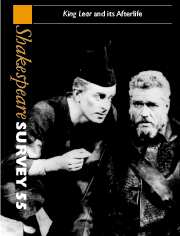Book contents
- Frontmatter
- King Lear: A Retrospect, 1980–2000
- How Shakespeare Knew King Leir
- Contracts of Love and Affection: Lear, Old Age, and Kingship
- Headgear as a Paralinguistic Signifier in King Lear
- What becomes of the broken-hearted: King Lear and the Dissociation of Sensibility
- Lear’s Afterlife
- Songs of Madness: The Lyric Afterlife of Shakespeare’s Poor Tom
- Secularizing King Lear: Shakespeare, Tate, and the Sacred
- ‘Look on her, look’: The Apotheosis of Cordelia
- Jacob Gordin’s Mirele Efros: King Lear as Jewish Mother
- ‘How fine a play was Mrs Lear’: The Case for Gordon Bottomley’s King Lear's Wife
- Some Lears
- King Lear and Endgame
- Shakespeare in Pain: Edward Bond’s Lear and the Ghosts of History
- ‘Think about Shakespeare’: King Lear on Pacific Cliffs
- Actors, Editors, and the Annotation of Shakespearian Playscripts
- Titus Andronicus: The Classical Presence
- Julius Caesar, Machiavelli, and the Uses of History
- Scepticism and Theatre in Macbeth
- Revels End, and the Gentle Body Starts
- ‘Taking just care of the impression’: Editorial Intervention in Shakespeare's Fourth Folio, 1685
- ‘A world elsewhere’: Shakespeare in South Africa
- Shakespeare Performances in England, 2001
- Professional Shakespeare Productions in the British Isles January–December 2000
- The Year's Contributions to Shakespearian Study 1 Critical Studies
- 2 Shakespeare’s Life, Times and Stage
- 3 Editions and Textual Studies (1) and (2)
- Books Received
- Index
Shakespeare in Pain: Edward Bond’s Lear and the Ghosts of History
Published online by Cambridge University Press: 28 March 2007
- Frontmatter
- King Lear: A Retrospect, 1980–2000
- How Shakespeare Knew King Leir
- Contracts of Love and Affection: Lear, Old Age, and Kingship
- Headgear as a Paralinguistic Signifier in King Lear
- What becomes of the broken-hearted: King Lear and the Dissociation of Sensibility
- Lear’s Afterlife
- Songs of Madness: The Lyric Afterlife of Shakespeare’s Poor Tom
- Secularizing King Lear: Shakespeare, Tate, and the Sacred
- ‘Look on her, look’: The Apotheosis of Cordelia
- Jacob Gordin’s Mirele Efros: King Lear as Jewish Mother
- ‘How fine a play was Mrs Lear’: The Case for Gordon Bottomley’s King Lear's Wife
- Some Lears
- King Lear and Endgame
- Shakespeare in Pain: Edward Bond’s Lear and the Ghosts of History
- ‘Think about Shakespeare’: King Lear on Pacific Cliffs
- Actors, Editors, and the Annotation of Shakespearian Playscripts
- Titus Andronicus: The Classical Presence
- Julius Caesar, Machiavelli, and the Uses of History
- Scepticism and Theatre in Macbeth
- Revels End, and the Gentle Body Starts
- ‘Taking just care of the impression’: Editorial Intervention in Shakespeare's Fourth Folio, 1685
- ‘A world elsewhere’: Shakespeare in South Africa
- Shakespeare Performances in England, 2001
- Professional Shakespeare Productions in the British Isles January–December 2000
- The Year's Contributions to Shakespearian Study 1 Critical Studies
- 2 Shakespeare’s Life, Times and Stage
- 3 Editions and Textual Studies (1) and (2)
- Books Received
- Index
Summary
Like ghosts we teach a dead religion, build a few more prisons to worship Caesar in, and leave it at that.
Edward BondWe haven't arrived where we live as long as Shakespeare writes our plays.
Heiner MüllerThere can be no starker alternative - or harsher antidote - to the Shakespearian afterlife concocted by the makers of Shakespeare in Love than Edward Bond's Lear, which was first produced in London in 1971 (unless, of course, we include in the mix Bond's later play Bingo, which had its first production in 1973). Though very differently situated, both works are studies in pain: in the social and political pathologies that produce it and the emotional pathologies produced by it. As such, they return us to a period in postwar cultural history when Shakespeare's status as 'our contemporary' was figured very differently than it is today, when a play like King Lear drew to itself correspondences to everything from the Holocaust to philosophical and theological assessments of the absurdity of the human condition and of man's inhumanity to man. Probably the most prominent manifestation of that moment's approach to King Lear is the punishing black-and-white austerity of Peter Brook's 1971 film, which in many ways served to illustrate Jan Kott's influential assessment of the play as Shakespeare's Endgame in Shakespeare Our Contemporary (1964).
- Type
- Chapter
- Information
- Shakespeare SurveyAn Annual Survey of Shakespeare Studies and Production, pp. 159 - 169Publisher: Cambridge University PressPrint publication year: 2002
- 1
- Cited by

